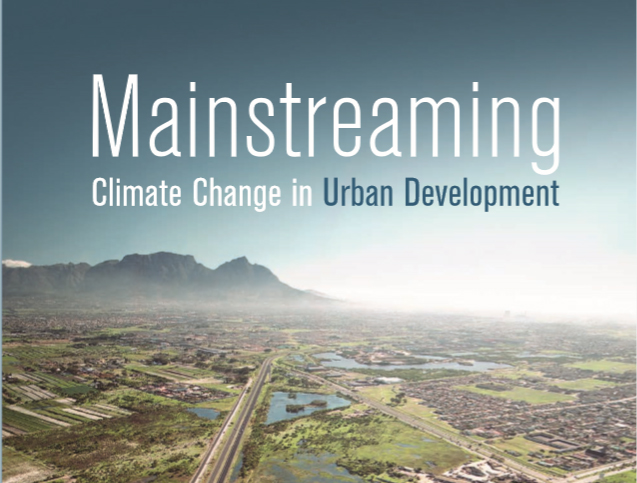Human activities contributes to the climate change. It is a need of time to identify the cause of this problem and take necessary actions to prevent future losses. In 2011, India’s urban centers constituted approximately 31% of the total population, contributing to 63% of the national GDP, and are projected to accommodate close to 40% of the total population, contributing to 75% of the national GDP very soon. An analysis of urban GDP growth to 2035 found 17 out of 20 the fastest-growing cities in the world would be in India. As cities continue to fuel India’s economic growth and remain centers for development, they also face challenges with respect to physical infrastructure, institution, health and environmental degradation. Studies indicate that poor planning and urban management are expected to cost Indians cities somewhere between $2.6 and $ 13 billion annually. Urban activities being the major contributors of GHG emission need attention. There are various stages of interventions, direct or indirect, which needs to be adopted as per the situation. International organizations and Indian government have framed various policies to adapt and mitigate climate change at a national and state level. However, these investment and development goals would be severely affected unless cities address the impact of climate variability and environmental changes manifesting in the increasing instances of extreme weather events (Storms, floods, heat waves etc.) based on the recorded data for loss and damage during 2000-2019 in terms of fatalities per 100,000 inhabitants and losses per unit GDP in percentage. As hubs of population, infrastructure and economic activities, cities have been most impacted by extreme events which are expected to increase in frequency and intensity with the changing climate.
With an intent to mainstream climate actions in Indian cities and establish a one stop for climate informed urban development, the National Institute of Urban Affairs (NIUA) with support from the Ministry of Housing and Urban Affairs (MoHUA) established the Climate Center for Cities (C- Cube) in June 2020. C- Cube is intended to support capacity building and knowledge retention for mainstreaming climate change action across urban India.

Photo courtesy: Mistra Urban Futures
The vision of the centre is to ‘Build Climate Actions in Cities’ with a strong belief that,
- Climate variability and climate change considerations need to be included in all urban projects and not implemented as separate initiatives &
- Cities mainstream climate actions through improved collaborations with stakeholders, improved planning infrastructure resilience and monitoring impacts.
The Centre takes a four step approach of enabling climate action.
- Developing policy recommendations
- Developing planning toolkits for cities to incorporate climate change considerations in land use planning, master planning, housing and urban development
- Implementing demonstrative local climate actions and
- Supporting the national program related to climate change.
To achieve these vision the Climate Centre for cities has six verticals, each focusing on one particular aspect, cumulatively adding to the big domain towards achieving urban climate resilience. These verticals are,
- P4 Support (Policy+Planning+project)
- Partnerships
- Capacity Building
- Data and innovation
- Advocacy and communication
- Research and knowledge Management
To enable cities in taking informed decision making of urban development from climate lens the centre developed the Climatesmart Cities Assessment Framework with the support of Ministry of Housing and Urban Affairs GoI, the first –of-its-kind assessment on climate relevant parameters under P4 Support vertical. The framework builds on the National Mission on Sustainable Habitat and its intended to be used as a tool for cities to inform investments, showcase evidence of their climate actions and monitor the impact. 126 cities participated in 2020-21 to assess their development in 28 indicators across 5 thematic areas- Urban planning, green cover and biodiversity, Energy and green buildings’ Mobility and Air Quality, Water Management and waste management. Currently the third round of the assessment is in progress as part of the Urban Outcomes Framework where 220+ cities are participating. The centre also revised the National Mission on Sustainable Habitat (NMSH) by aligning it to the CSCAF indicators for monitoring progress in cities. C-cube lead the chapter on ‘Energy and Material Efficient Building and Low Carbon Urbanization’ for the ‘Long-term Low Emission Development Strategy’ (LT-LEDS) submitted by India to the UNFCCC on NDC, by incorporating the CSCAF as a monitoring mechanism for the low emission development in the strategy. Now the centre in coming up with Climate Action plan for Pune, Kolkata, Leh, Jamnagar and Junagadh and flood resilience strategy for Agra, Aligarh, Bareilly, Madurai and Tirunelveli.
Since its inception, the Centre has also set up Climatesmart Cities Alliance, which is a multi-stakeholder group of institutions and partners to support mainstreaming of climate actions across Indian cities. As of now, the Alliance has 75+ partner organizations including international agencies and networks, donors, NGOs, private sector organizations, rating agencies, incubators, data and technology firms. The centre has also initiated the,’ Climate Practitioners India Network’ to create a platform for young practitioners to support cities locally. 1000+ Climate Practitioners Network are part of the platform from 100+ cities.

Photo courtesy: Bengaluru Sustainability Forum
One of the centres motives is Capacity building, the Centre in partnership with Climate Alliance partners and training institutes aims to develop local capacities for building climate actions. Under this C- cube has designed, developed and delivered 26 training modules aligned to the themes of Urban planning, green cover and biodiversity, Energy and green buildings, Mobility and Air Quality, Water Management and Waste Management of mainstreaming climate actions in urban development; where 3500+ city officials across 40+ cities were trained in phase 1 of it. Initiated the Leaders in Climate Change Management program, an end-to-end training program (including training, project development and handholding support for project implementation) for creating 5000 climate leaders in cities. The centre conducted a 10 part e-learning series in association with WRI India which demonstrated the benefit of cross-sectoral and multinstitutional collaborations for implementing climate actions. The centre also established the Climate Capacity Grid with 12 regional and academic institutions for scaling up training across the country. C- Design and Development of CLAP NOW Card Game to facilitate interactive learning for understanding the process of developing a climate actions plan.
Vardhman Envirotech
India’s Passionate rainwater company
This article is published on: – SOCLEEN MAGAZINE – FEBRUARY 2023
Author: – Hitesh Vaidya
We would like to spread this for the benefit of fellow Indians.
